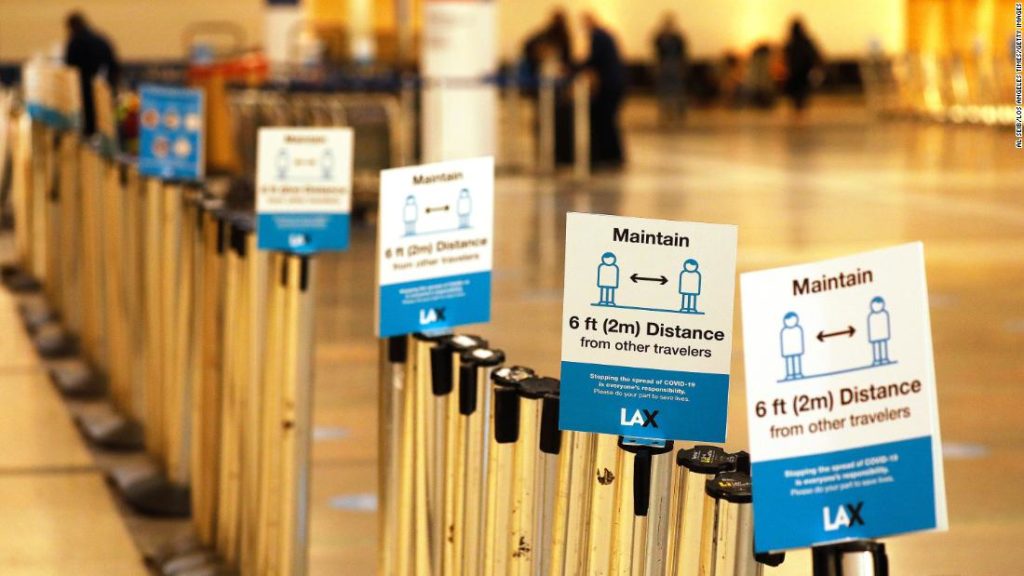“We have learned that these colder months when people are clustering inside, the numbers are going to go up,” CNN’s Chief Medical Correspondent Dr. Sanjay Gupta said Monday night. “Hospitalizations are expected to maybe even hit 100,000.”
“We used to talk about the number of people becoming newly infected on any given day hitting 100,000 seemed outrageous. There may be that many people in the hospitals,” he added.
Across the country, hospitals are filling up.
In St. Louis, officials announced modeling data suggesting ICU capacity could run out around the first week of December if current rates continue.
“Covid-19 is spreading much too quickly and sending far too many people to our hospitals and intensive care units,” Incident Commander of the St. Louis Metropolitan Pandemic Task Force Dr. Alex Garza said Monday. “We are now at a tipping point. The actions that we take today will determine what the next weeks and months will look like.”
And while hundreds of Americans continue to die every day, that number will likely only rise as hospitalizations keep going up, former FDA Commissioner Dr. Mark McClellan told CNN Monday.
“The problem is that we’ve got these outbreaks, these hot spot areas where we’re approaching health system capacity really all over the country now, it’s not just one part of the country or region,” he said.
Preparing for a vaccine
And while the high efficacy rates coming out of the Moderna and the Pfizer/BioNTech vaccine trials are a good first step, a vaccine has yet to be approved and experts will also have to decide which groups should get vaccinated first.
An advisory committee to the US Centers for Disease Control and Prevention is scheduled to meet next week to decided who will get the vaccine first, a longtime member of the committee said.
Members of the Advisory Committee on Immunization Practices received notice last week that they’ll meet November 23 for five hours, according to committee member Dr. William Schaffner.
Among the first to be vaccinated will likely be health care workers and essential workers as well as people over the age of 65 and people with existing health conditions. The question is what order those groups should come in, Schaffner said.
“Health care workers are baked in — that’s the first thing to happen, no doubt about that,” he said. But after that, committee members will need to define what underlying conditions would merit getting a vaccine early on and what defines “essential workers” — a group that could include everyone from police officers to supermarket clerks.
And even once a vaccine is approved and more doses become available, it will be months before the US returns to anything resembling normalcy.
“There’s not going to be one day when, you know, the light switch is going to go on and everybody is going be immune,” McClellan said. “But we should do a gradually better and better job of containing spread, of avoiding hospitalizations and moving beyond the pandemic in the months to come.”
“But we have got a couple of tough months to get through first,” he added.
Statewide measures taking effect this week
In California, Gov. Gavin Newsom said the state is experiencing the “fastest increase in cases we have seen yet” and announced 28 counties were moving into the most restrictive tier of the state’s reopening plan.
Guidance for college students returning home
As the Thanksgiving holiday nears, Connecticut Gov. Ned Lamont issued guidance on Monday for out-of-state college students who are planning on returning home to the state for Thanksgiving.
Lamont asked the returning students to self-quarantine for 14 days before or after returning home, get tested for the virus both before leaving school and after getting home, not attend parties or reunions and not quarantine with any elderly or high-risk family members.
“We can’t enforce this,” he said. “I’m going to have to depend upon your good judgment … that you follow the protocols, you follow the quarantine, and you follow the testing.”
Public health officials and state leaders have repeatedly emphasized how critical the upcoming holidays are and have expressed concern that family and friend gatherings will help fuel an already rampant spread.
“Separation should be the norm,” this year, Schaffner also previously urged.
“Less is more this Thanksgiving,” he said. “It is the Covid Thanksgiving. We don’t want to give the virus while we’re giving thanks.”
CNN’s Lauren Mascarenhas, Elizabeth Cohen, Kelly Christ and Raja Razek contributed to this report.
You may also like
-
UK coronavirus variant has been reported in 86 countries, WHO says
-
NASA technology can help save whale sharks says Australian marine biologist and ECOCEAN founder, Brad Norman
-
California Twentynine Palms: Explosives are missing from the nation’s largest Marine Corps base and an investigation is underway
-
Trump unhappy with his impeachment attorney’s performance, sources say
-
Lunar New Year 2021: Ushering in the Year of the Ox

